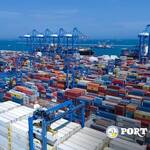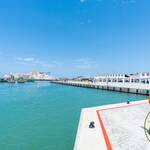President Nana Addo Dankwah Akufo-Addo has urged stakeholders in the Maritime sector, especially those in the maritime security sector to employ technology in the maritime strategy to break the criminal enterprises operating on the sea.
He noted that these criminal enterprises are a step ahead of the authorities due to their use of sophisticated technology which requires the use of more advanced technology to take them down.
National Integrated Maritime Strategy
The President made this call when he addressed the opening ceremony of the two-day International Maritime Defense Exhibition and Conference, and the launch of the National Integrated Maritime Strategy (NIMS) at Burma camp in Accra.
The blueprint, developed by Ghana’s Ministries of National Security, and Transport, provides the processes for safeguarding and enhancing security of the nation’s maritime domain.
“Naval chiefs, participants and Maritime stakeholders must thus find innovative solutions to strengthen further the gains made in creating a conducive environment for business to thrive. The fact remains that with the concerted effort of the Ghana navy and other key Maritime stakeholders, Ghana has not recorded any piracy or armed robberies at sea since 2022.”
“The fact that some ship owners reported a few unverified petty theft incidents at anchorage could not be equated to piracy in the context of International Maritime Law definition.”
“As much as international Maritime ratings stakeholder organisations contribute towards international shipping, they should be mindful of the implications of inaccurate reportage on the nation’s ability to participate in global trade.”
“I urge the Maritime law enforcers to consider using technology to break the vital links between these crimes and criminal syndicates. Technology has become a vital tool in our quest to sustain a safe and secure Maritime domain.”
The President however noted that these criminals are a step ahead of the authorities due to their use of sophisticated technology which requires more advanced technology to take down.
He urged Maritime security stakeholders to “take charge of the technological domain in order to deny access to terror groups which are on drifting southwards from the Sahel.”
He stressed the “need for a multifaceted technological approach to deny these criminal elements unauthorized use of underwater, surface and above water resources by criminal and economic saboteurs.”
The Chief of Naval Staff, Rear Admiral Issah Adam Yakubu, in his welcome address noted that Ghana has not experienced any significant attack or kidnapping in the last two years, except for petty thefts on ships at anchorages, particularly the Takoradi anchorage. A development he has vowed to deal with.
He however indicated that the situation in the Gulf of Guinea, which in 208 was declared the most dangerous waters in the world has improved significantly, although there has been a resurgence of piracy in offshore waters typically over 100 nautical miles away from the geographical Gulf of Guinea.
He stated that the conference will afford stakeholders with a common understanding of the problems that bedevil the littoral states and help them develop a regional and international framework for dealing with the challenge of piracy in particular and transnational crimes in general.
The Minister of Transport, Kwaku Ofori Asiamah, indicated that the NIMS is a blueprint to safeguard and enhance the safety and security of the Maritime domain.
He stated that in an increasingly globalized world, Maritime safety and security are essential to the protection of national interest and the well -being of coastal communities.
He indicated that an assessment conducted on the security of the nation’s Maritime domain showed that Ghana has the needed foundation to build a strong coordinated strategy t o not only protect the Gulf of Guinea, but also open up the nation’s maritime domain for national development.
The Ministries of Transport and National Security therefore commenced the development of the NIMS with the goal of contributing to the growth of the Maritime economy. The NIMS he indicated will determine Ghana’s relations with other Gulf of Guinea states.
The NIMS he said, was developed with six strategic objectives in min, namely: strengthening the framework of maritime governance; ensuring the safety of Ghana’s Maritime domain; developing a thriving Blue Economy; protecting the marine and coastal environment; promoting capacity building, research, awareness and knowledge sharing; and developing dynamic and diversified regional and international cooperation.
Asiamah revealed that it is envisaged that by the year 2030, Ghana will be the safest Maritime spot on the world’s oceans, with a booming shipping industry, trade and research hub in the Gulf of Guinea.
However, this rosy picture could be derailed by the activities of criminal elements, therefore,” harnessing resources and expertise of key stakeholders through MIMs is a step in the right direction.”
Albert Kan Dapaah, the National Security Minister said that “the launch of the NIMs document marks a significant milestone in the Ghana’s history, and marks a defining moment that reaffirms the nation’s commitment to safeguarding our territorial waters and securing our domain.”
He said the document is imperative to fostering safety and protection of the nation’s territorial waters.
The Gulf of Guinea he admitted had facilitated trade and supported the fishing industry as well as connected the nation to the global community.
Despite these benefits, the nation has had to grapple with piracy and armed robbery at sea.
These threats he said have not only endangered the nation’s economic interest but also posed a challenge to national security and stability.
The launch of the NIMS document is therefore a bold step toward mitigating these maritime threats.
The document he said “is a comprehensive framework that reflects the unity of purpose of among various government agencies, Ministries and stakeholders.
“It is the embodiment of our collective determination to protect our territorial waters, enhance our maritime surveillance capabilities and ensure of all our seafarers.”
He lauded the Nana Akufo-Addo-led Administration for investing in maritime infrastructure, saying with the availability of those resources, the Ghana Navy had stepped up efforts in surveillance and patrol of the maritime domain.
Following the grand success of the first two editions, the third IMDEC features the largest gathering of Africa’s maritime industry.
Ghana Navy is hosting the regional and international Chiefs of Naval Staff to address the principal issues facing maritime security on the continent.
They will deliberate on the increasingly volatile threats facing Africa’s territorial waters and its blue economy.
On the sidelines, the conference will be showcasing the latest technologies in maritime security and strong resolutions and recommendations to surmount the daunting maritime challenges.
This is expected to help maritime and naval industries find appropriate solutions to their challenges and threats and discover the new technologies to better fight and curb illicit activities at sea.
- With honour culture, Mahama wouldn’t need appointee Code - 12 May 2025
- Dollar role under pressure from portfolio rebalancing - 11 May 2025
- Ghanaians denied US Visa in 2024 paid $6.6m in fees - 11 May 2025




